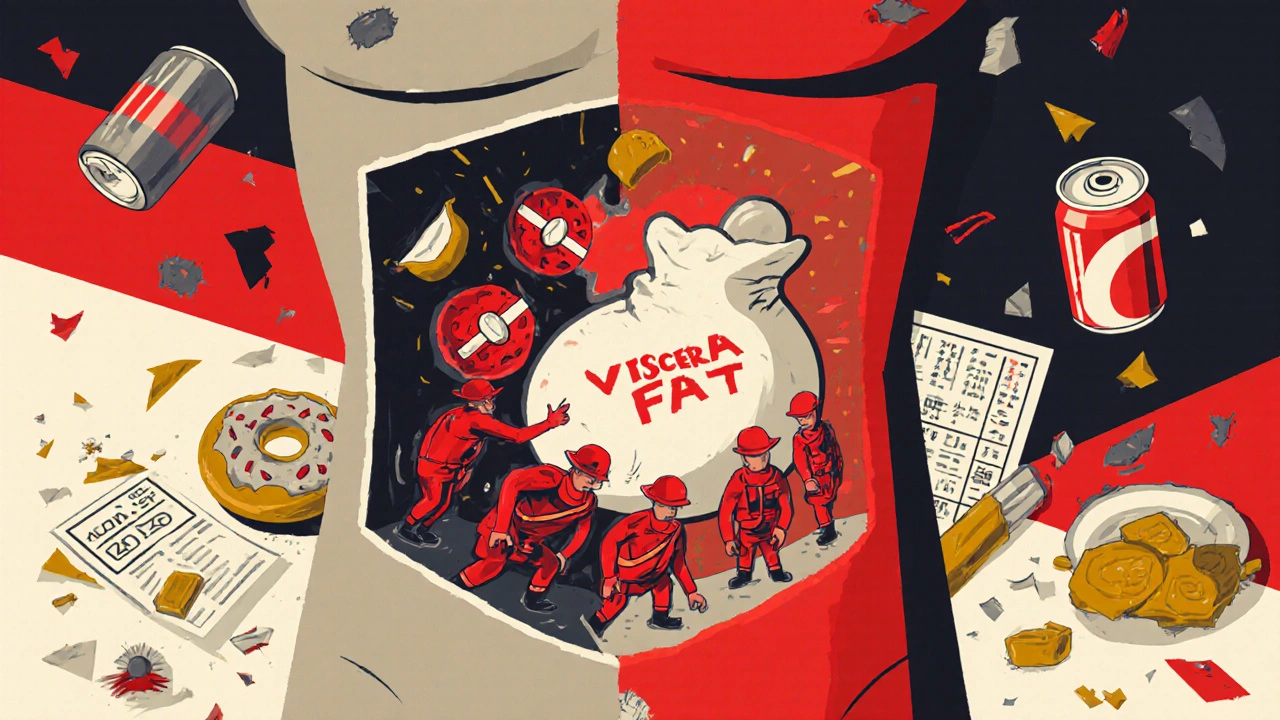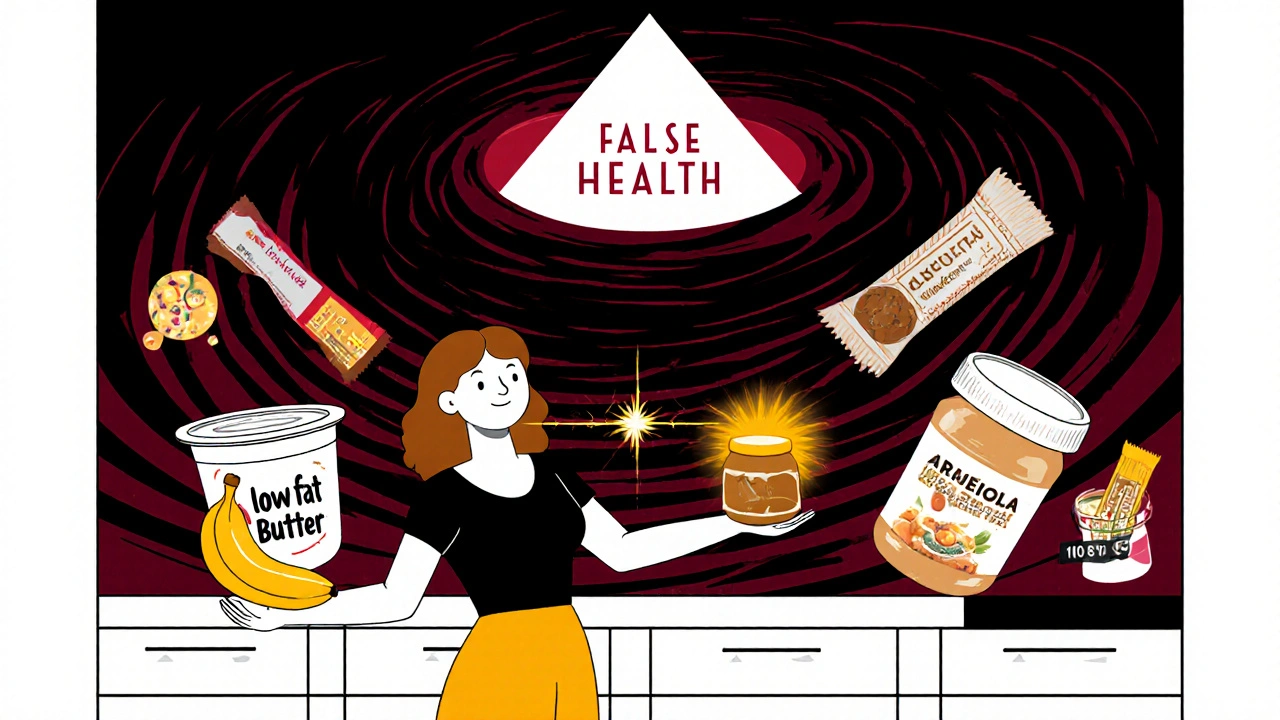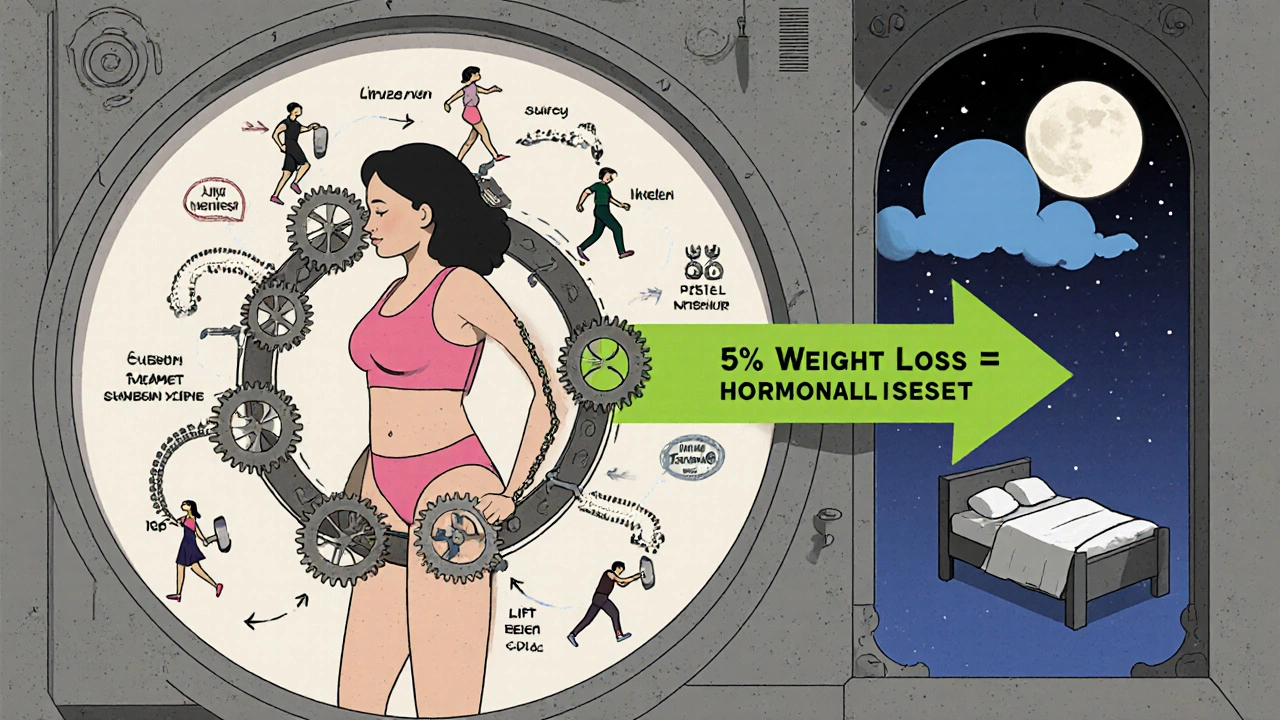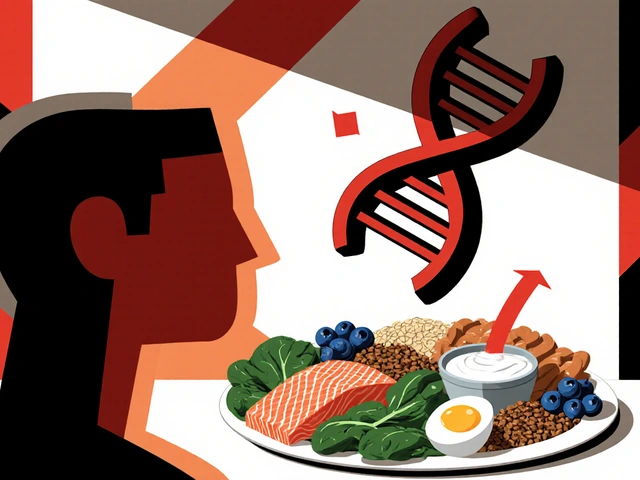
Why Losing Weight Feels Impossible with PCOS
If you have PCOS and have tried dieting before, you know it’s not just about willpower. You eat less, move more, and still the weight won’t budge-especially around your belly. That’s not your fault. It’s biology. PCOS isn’t just about irregular periods or acne. At its core, it’s a metabolic disorder driven by insulin resistance, and that’s what makes weight gain stubborn, relentless, and deeply frustrating.
Insulin is the hormone that tells your body to store fuel-whether from carbs, protein, or fat. When you’re insulin resistant, your cells stop listening. Your pancreas responds by pumping out even more insulin to compensate. That extra insulin doesn’t just float around. It tells your body to store fat, especially in your abdomen. It also blocks fat from being burned. And it triggers your ovaries to make more testosterone, which worsens PCOS symptoms like hair growth, acne, and missed periods. It’s a loop: insulin resistance → weight gain → worse insulin resistance → more weight gain.
Research shows 70-95% of people with PCOS who are overweight have insulin resistance. But even those who aren’t overweight? Around 30-75% still have it. That means this isn’t just a problem for people who are obese. It’s a core feature of PCOS, no matter your size. And it’s why standard calorie-counting diets often fail. You’re not fighting hunger-you’re fighting hormones.
How Insulin Resistance Changes Your Body
Insulin resistance doesn’t just make you gain weight-it changes where you gain it. Most women store fat in their hips and thighs (the classic "pear shape"). With PCOS, fat settles around your waist (the "apple shape"). That’s not random. Abdominal fat is metabolically active. It releases inflammatory chemicals that make insulin resistance worse. It also lowers your levels of sex hormone-binding globulin (SHBG), which normally keeps testosterone in check. Lower SHBG = more free testosterone = more PCOS symptoms.
High insulin also messes with your hunger signals. It suppresses leptin, the hormone that tells you you’re full. At the same time, it spikes ghrelin, the hunger hormone. That’s why you feel hungry even after eating. You crave sugar and carbs because your body is screaming for quick energy-your cells aren’t getting fuel from the food you eat because insulin won’t let them use it. So you eat more, gain more weight, and your insulin gets even higher.
Chronic low-grade inflammation, common in PCOS, adds another layer. It makes your cells even less sensitive to insulin. It also affects thyroid function and cortisol levels, both of which influence metabolism. The result? A body that’s primed to hold onto fat, even when you’re eating "clean."
The Health Risks You Can’t Ignore
PCOS-related weight gain isn’t just about how you look. It’s about your long-term health. Women with PCOS are up to seven times more likely to develop type 2 diabetes than women without it. The risk jumps even higher if you’re overweight. High insulin levels damage your pancreas over time, making it harder to produce enough insulin to keep blood sugar stable.
High blood pressure, high cholesterol, and heart disease are also far more common in women with PCOS. That belly fat? It’s not just inconvenient-it’s dangerous. Fat around your organs (visceral fat) releases fatty acids directly into your liver, raising triglycerides and LDL cholesterol. This increases plaque buildup in your arteries, raising your risk of heart attack and stroke.
And it doesn’t stop there. Insulin resistance and excess estrogen from fat tissue can cause the lining of your uterus to thicken abnormally, increasing your risk of endometrial cancer. Sleep apnea, infertility, and depression are also more common. These aren’t side effects. They’re direct consequences of the same root problem: insulin resistance.

What to Eat: Diet Strategies That Actually Work
You don’t need a fancy diet. You need a strategy that lowers insulin. The goal isn’t to lose weight fast-it’s to break the insulin cycle. Here’s what works, based on clinical evidence and real-world results:
- Reduce refined carbs and sugars. White bread, pasta, rice, pastries, soda, and candy cause rapid spikes in blood sugar and insulin. Replace them with whole grains, legumes, and non-starchy vegetables.
- Choose low-glycemic foods. These release sugar slowly. Think apples instead of apple juice, oats instead of sugary cereal, sweet potatoes instead of white potatoes.
- Pair carbs with protein and fat. Eating a banana alone? Blood sugar spikes. Eating a banana with peanut butter? Much slower rise. Protein and fat blunt insulin spikes.
- Don’t skip meals. Skipping leads to blood sugar crashes, which trigger cravings and overeating later. Eat regular meals-every 4 to 5 hours.
- Include fiber-rich foods. Soluble fiber (oats, beans, flaxseed, broccoli) slows digestion and improves insulin sensitivity. Aim for 25-30 grams a day.
- Watch portion sizes-even healthy carbs. A big bowl of quinoa still raises insulin. Use your hand as a guide: one palm-sized portion of carbs per meal.
There’s no one-size-fits-all diet for PCOS, but the most effective approaches-like the Mediterranean diet, low-glycemic diets, and even moderate low-carb plans-all share one thing: they reduce insulin spikes.
What to Avoid: The Hidden Triggers
Some foods people think are "healthy" can actually make PCOS worse:
- Low-fat processed foods. When fat is removed, sugar is added. Low-fat yogurt? Often loaded with sugar. Check labels.
- Artificial sweeteners. Studies suggest they may disrupt gut bacteria and worsen insulin resistance, even if they have no calories.
- Excessive fruit juice. Even 100% juice removes fiber and concentrates sugar. Eat whole fruit instead.
- Alcohol. Especially sugary cocktails. Alcohol slows fat burning and spikes insulin.
- Ultra-processed snacks. Chips, crackers, and granola bars are often high in refined carbs and unhealthy fats.
It’s not about perfection. It’s about reducing the frequency of insulin spikes. One slice of pizza won’t ruin you. Daily sugary drinks? That’s the problem.

Lifestyle Beyond Diet
Diet is powerful, but it’s not the whole story. Movement matters-but not in the way you think. You don’t need to run marathons. Strength training two to three times a week builds muscle, which improves insulin sensitivity more than cardio alone. Even walking 20-30 minutes after meals helps lower blood sugar spikes.
Sleep is critical. Poor sleep raises cortisol, which increases insulin resistance and cravings. Aim for 7-8 hours. Stress management matters too. Chronic stress keeps cortisol high, which makes weight loss harder. Try breathing exercises, yoga, or simply taking five minutes to sit quietly each day.
Medications like metformin can help lower insulin, but they work best with diet and movement. They’re not a substitute. They’re a tool.
Progress, Not Perfection
You don’t need to lose 50 pounds to see results. Losing just 5-10% of your body weight can restore ovulation, improve insulin sensitivity, lower testosterone, and reduce acne and hair growth. That’s not a miracle. That’s science.
Focus on how you feel-not just the scale. Do you have more energy? Fewer cravings? Better sleep? Those are wins. Your body is healing. It’s not about fitting into a smaller dress. It’s about reducing your risk of diabetes, heart disease, and cancer. That’s worth every step.
PCOS doesn’t mean you’re broken. It means your metabolism is wired differently. Once you understand how insulin drives this, you can work with your body-not against it.
Can you lose weight with PCOS?
Yes, but it requires a different approach than typical weight loss plans. Because PCOS is driven by insulin resistance, focusing on stabilizing blood sugar through low-glycemic foods, protein, healthy fats, and fiber is more effective than simply cutting calories. Losing even 5-10% of body weight can significantly improve symptoms and insulin sensitivity.
Why is belly fat so hard to lose with PCOS?
High insulin levels promote fat storage in the abdomen and block fat burning. Abdominal fat is also more metabolically active, releasing chemicals that worsen insulin resistance and increase testosterone. This creates a cycle: more belly fat → worse insulin resistance → more fat storage. Breaking this cycle requires dietary changes that lower insulin, not just more cardio.
Is a low-carb diet the best for PCOS?
Many women with PCOS benefit from reducing refined carbs and sugars, but extreme low-carb diets aren’t necessary for everyone. A moderate approach-focusing on low-glycemic carbs, paired with protein and fat-is often more sustainable and just as effective. The goal is to avoid blood sugar spikes, not eliminate carbs entirely.
Does metformin help with PCOS weight loss?
Metformin improves insulin sensitivity, which can help reduce cravings, lower insulin levels, and support modest weight loss. It’s often prescribed for PCOS, especially when insulin resistance is high. But it works best alongside diet and movement. It’s not a magic pill-it’s a tool to help your body respond better to healthy habits.
Can PCOS be reversed with diet and lifestyle?
PCOS is a chronic condition, but its symptoms can be significantly improved or even normalized with lifestyle changes. Many women regain regular periods, reduce hair growth and acne, and restore fertility by managing insulin resistance through diet, movement, and sleep. While the underlying hormonal pattern may remain, the visible and health-related effects can be reversed.
What Comes Next?
If you’re struggling with PCOS and weight, start small. Pick one thing: swap soda for water, add protein to breakfast, or take a 15-minute walk after dinner. Track how you feel-not just the scale. Over time, these small changes add up. Your body isn’t broken. It’s just responding to the signals it’s been given. Change the signals, and your body will change too.




14 Comments